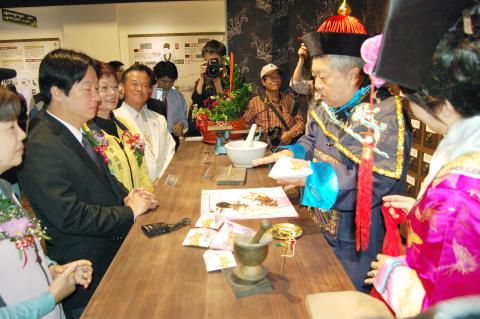Herbal medicine is for everyday life, not just for sickness, staff at a Chinese medicinal herb tourist factory said as it opened in Greater Tainan’s Guantian District Industrial Area on Sunday.
Tainan Mayor William Lai (賴清德) said Taiwanese are health-conscious and understand that taking medicinal herbs, even when healthy, is good for the body as a whole.
The Tian Yi factory combines relaxation, food and Chinese medicinal knowledge, specializing in knowledge of how Chinese medicine can be incorporated into everyday life.

Photo: Yang Chin-cheng, Taipei Times
General manager Chen Hui-chua (陳慧娟) said the new Chinese medicinal tourist factory is the third among 14 tourist factories in the municipality.
The factory has its roots in a renowned and venerated Chinese medicinal brand that was better at making medicine than carrying out marketing, Chen said, adding that it was the city’s hope that the factory could help bridge tradition-steeped Chinese medicine with a health-conscious modern world.
“Even if the tastes of Chinese medicine do not agree with everyone, we hope that healthy drinks and teas will eventually be embraced by the younger generation,” Chen said.
The factory is divided into four sections, including a gallery illustrating the development of Chinese medicine over the past 5,000 years, as well as the personal stories of traditional Chinese medicine doctors of old, Chen added.
“There is also an display that explains the process of making Chinese medicine and common concepts of when to use them” Chen said.
“There is a section where tourists can experience what it felt like to be a traditional medicine doctor in the old days,” she said.
“There is also a dining area, where people can try meals that incorporate Chinese medicines,” Chen added.
The meals are a joint effort by the factory and the National Kaohsiung University of Hospitality and Tourism, she said.

Alain Robert, known as the "French Spider-Man," praised Alex Honnold as exceptionally well-prepared after the US climber completed a free solo ascent of Taipei 101 yesterday. Robert said Honnold's ascent of the 508m-tall skyscraper in just more than one-and-a-half hours without using safety ropes or equipment was a remarkable achievement. "This is my life," he said in an interview conducted in French, adding that he liked the feeling of being "on the edge of danger." The 63-year-old Frenchman climbed Taipei 101 using ropes in December 2004, taking about four hours to reach the top. On a one-to-10 scale of difficulty, Robert said Taipei 101

Nipah virus infection is to be officially listed as a category 5 notifiable infectious disease in Taiwan in March, while clinical treatment guidelines are being formulated, the Centers for Disease Control (CDC) said yesterday. With Nipah infections being reported in other countries and considering its relatively high fatality rate, the centers on Jan. 16 announced that it would be listed as a notifiable infectious disease to bolster the nation’s systematic early warning system and increase public awareness, the CDC said. Bangladesh reported four fatal cases last year in separate districts, with three linked to raw date palm sap consumption, CDC Epidemic Intelligence

US climber Alex Honnold left Taiwan this morning a day after completing a free-solo ascent of Taipei 101, a feat that drew cheers from onlookers and gained widespread international attention. Honnold yesterday scaled the 101-story skyscraper without a rope or safety harness. The climb — the highest urban free-solo ascent ever attempted — took just more than 90 minutes and was streamed live on Netflix. It was covered by major international news outlets including CNN, the New York Times, the Guardian and the Wall Street Journal. As Honnold prepared to leave Taiwan today, he attracted a crowd when he and his wife, Sanni,

Taiwanese and US defense groups are collaborating to introduce deployable, semi-autonomous manufacturing systems for drones and components in a boost to the nation’s supply chain resilience. Taiwan’s G-Tech Optroelectronics Corp subsidiary GTOC and the US’ Aerkomm Inc on Friday announced an agreement with fellow US-based Firestorm Lab to adopt the latter’s xCell, a technology featuring 3D printers fitted in 6.1m container units. The systems enable aerial platforms and parts to be produced in high volumes from dispersed nodes capable of rapid redeployment, to minimize the risk of enemy strikes and to meet field requirements, they said. Firestorm chief technology officer Ian Muceus said